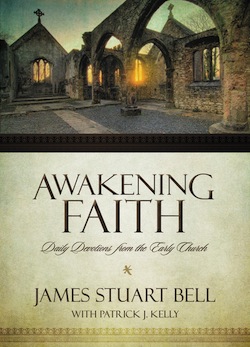His divine power has given us everything we need to experience life and to reflect God’s true nature through the knowledge of the One who called us by His glory and virtue. Through these things, we have received God’s great and valuable promises, so we might escape the corruption of worldly desires and share in the divine nature. – 2 Peter 1:3-4
When we have come to know the true God, both our bodies and our souls will be immortal and incorruptible. We will enter the Kingdom of Heaven, because while we lived on earth we acknowledged Heaven’s King. As friends of God and coheirs with Christ, we will not be controlled by evil desires or tendencies, nor by any sickness of body or soul, for we will have become divine.
You may suffer evil as a person, and God allows it because of your humanity; however, God has promised you a share in every one of His attributes when you have been deified.
The saying “Know yourself” therefore means that we should recognize and acknowledge the image in which God created us, for if we do this, we will in turn be recognized and acknowledged by our Maker.
So let us not be at war with ourselves, but change our way of life without delay. For Christ who “is God, exalted above all creation” (Psalm 83:18; Philippians 2:9-11), has taken away humanity’s sin and refashioned our fallen nature. God proved His love for us in the beginning when He made man and woman in His Image.
If we obey His holy commands and learn to imitate His goodness, we shall be like Him and He will honor us. God is not selfish, and has given us a share in His divinity for the sake of His own glory.
~ Hippolytus*
Excerpted with permission from Awakening Faith by James Stuart Bell, copyright Zondervan, 2013.
*According to Orthodoxwiki, Hippolytus (Hippolytus of Rome) was a priest and theologian of the third century who was martyred in 235. The early life of Hippolytus is unknown. He was born about the year 170 and lived in Rome when young. Greek was his native tongue. At the beginning of the third century he was a priest noted for his learning, eloquence, zeal, and moral earnestness. He came into conflict with the opinions of the bishops of Rome on christological issues of the day to such an extant that came to allow himself to be elected a rival bishop of Rome, the first antipope, from about 217 to 235. He was among the most important Christian theologians of the third century, particularly for his work Philosophoumena (part of his larger work Refutation of All Heresies).
* * *
Your Turn
Read 2 Peter 1:3-4 again. As long as we’re on this earth we will be confronted with and frustrated by evil desires, habits that don’t conform with who God has redeemed us to be, and the old way of living before Christ became our Savior? Ephesians 1:7 says that in Christ “we have redemption through His blood, the forgiveness of sins.” And Romans 8:37 says “we are more than conquerors through Him who loved us.” Pastors, how do you encourage your people to not be at war with themselves but instead to imitate Christ? We would love to hear from you! Please, join the conversation on our blog!



